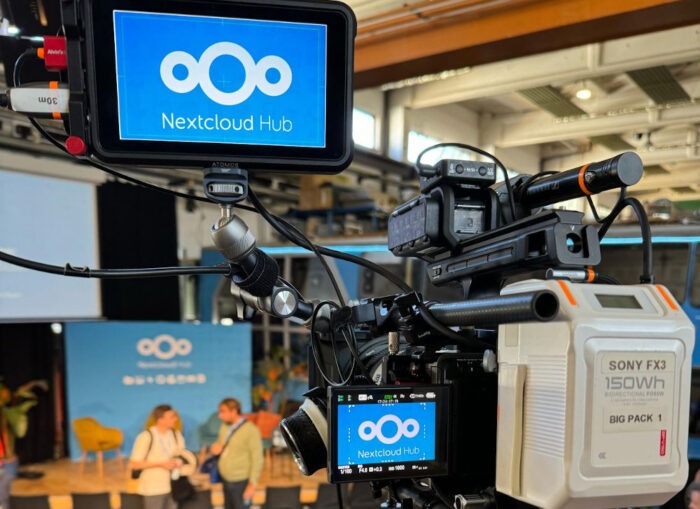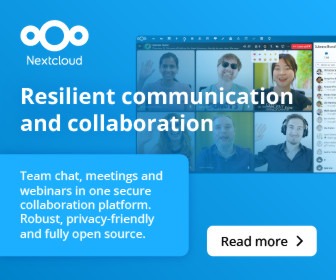Here’s a look at the new features and expanded capabilities in Nextcloud Hub 9 which was released on Saturday.

Nextcloud has just released Nextcloud Hub 9, with a renewed focus on decentralization, which means its federated aspects can now plays a broader role. There are also some all new features, including Flow, a built-in process automation platform, a new whiteboard, a form entry feature in Nextcloud Office, and an AI chat UI for Nextcloud Assistant. As always, this new release is 100% open-source. It’s copyleft actually — licensed under AGPLv3.
Although Wikipedia continues to call Nextcloud a file hosting platform — which is what it was something like a dozen lifetimes ago — these days the platform radically redefines what it means to be an easy-to-use self-hosted portal. For sure, it’ll still host files, but it also does a lot more. For example, do you want to place a video call? Nextcloud can do that. Do you need to collaborate on a project involving text and graphics? Nextcloud can do that too. Do you want to… well, you get the picture.
Welcome to the Decentralized Nextcloud Federation
The announcement of Nextcloud Hub 9 was made on Saturday at Nextcloud Community Conference 2024 in Berlin, as well as on a blog by Nextcloud’s marketing manager Mikhail Korotaev on Nextcloud’s website.
“We designed Nextcloud with decentralization in mind,” he wrote. “You can run it at home, in your business, your government agency, or your local sports club. You decide who has access, and when the services of a big tech firm fall over, you can keep working.”
Korotaev is addressing the fact that Nextcloud users can share across servers, or more precisely, across installations of Nextcloud, whether they be sharing the same server or located on another server that could be across the ocean on another continent. That’s long been the case with Nextcloud, and is one of the things that differentiates it from similar platforms.
In this way it’s much like social networking’s fediverse, the best known example being Activity Pub, in which a bunch of instances join together to form Mastodon. Just like with social’s fediverse, the owners of each Nextcloud site can decide exactly what they’re sharing and what they’re not, meaning they don’t have to share at all. Business-to-business companies could use the feature, for example, to help their customers connect to invoices, shipping statuses, and the like, while still keeping their latest developments under wraps.
“Federation allows users on different servers to communicate and share with each other,” is how Nextcloud put it in a statement on its website. “With Nextcloud Hub 9 the core abilities of Nextcloud Hub are fully decentralized, enabling users to share and work on documents, engage in chat and video calls without having to own accounts on multiple servers. Using their federated cloud ID, similar to an email address or Mastodon account, users can invite users from other servers to join a file share, document editing session, chat room, or call.”
Although “federating” Nextcloud will end up being a defining feature of the platform down the road, the itch it’s probably meant to immediately scratch is regulation. Nextcloud is headquartered in Germany, and the vast majority of its users are located in Europe, a region that’s far more willing to address issues such as privacy and data sovereignty through regulation than we seem to be on this side of the Atlantic.
“Regulators are responding to a growing backlash against big tech firms from users who perceive their behavior as market abuse, with the term ‘malicious compliance’ being used,” Frank Karlitschek, co-founder and CEO at Nextcloud, said in a statement. “This trend causes a growing interest in decentralisation technologies.”
What Else Is New in Nextcloud Hub 9
The new release also introduces Nextcloud Flow, a business process engine that takes advantage of a number of components already available in Nextcloud — the Open Collaboration Services API; Nextcloud Tables, a structured data management application, the platform’s existing workflow tool — and combines them with a new business process automation application based on the open-source developer platform and workflow engine, Windmill.
“Windmill integration in Nextcloud Hub automates repetitive tasks by integrating your Nextcloud Hub apps and related assets into cohesive workflows,” Korotaev explained, listing vacation requests, payment confirmations, or approvals for accessing and sharing data as examples. “The app provides a graphic interface to design, manage, and monitor workflows, making it easier to automate processes and improve efficiency.”
Flow also ties in with Nextcloud Assistant, the platform’s advanced AI application which gained a new chat interface in this release. With Flow, data can be sent to or retrieved from Assistant automatically, allowing Assistant’s AI to help fill in documents or summarize data.
If this sounds good and you want to take Nextcloud for a test drive, it’s easy to install. If you can get WordPress up and running, then you have about all of the skills you need to install Nextcloud. There are also plenty of ways to pay for a hosted version of the platform — whether you be a Fortune 500 enterprise or a mere mortal. There’s a list on the platform’s website.
Nextcloud Hub 9 is available immediately, with downloads of the All-in-One Docker container and virtual machine image available at nextcloud.com/install.
Christine Hall has been a journalist since 1971. In 2001, she began writing a weekly consumer computer column and started covering Linux and FOSS in 2002 after making the switch to GNU/Linux. Follow her on Twitter: @BrideOfLinux









very good!